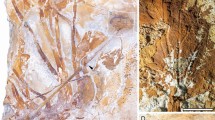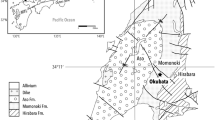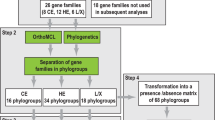Abstract
Phylloglossum drummondii, Kunze is a small and relatively rare cryptogam of New Zealand and Australia. It is considered to be a lycopod which is reduced and specialized in the adoption of a geophytic habit1. So far as we know, it has not been examined for any of its organic chemical constituents.
This is a preview of subscription content, access via your institution
Access options
Subscribe to this journal
Receive 51 print issues and online access
$199.00 per year
only $3.90 per issue
Buy this article
- Purchase on Springer Link
- Instant access to full article PDF
Prices may be subject to local taxes which are calculated during checkout
Similar content being viewed by others
References
Sampson, K., Ann. Bot., 30, 316 (1916).
Towers, G. H. N., and Maass, W. S. G., Phytochemistry, 4, 57 (1965).
Rothmaler, W., Feddes Report, 54, 55 (1944).
Hough, L., Jones, J. K. N., and Wadman, W. H., J. Chem. Soc., 1702 (1950).
Manske, R. H. F., and Marion, L., Canad. J. Res., 1320, 87 (1942).
Stahl, E., Thin-Layer Chromatography, 493 (Springer-Verlag, 1962).
Author information
Authors and Affiliations
Rights and permissions
About this article
Cite this article
WHITE, E., TSE, A. & TOWERS, G. Lignin and Certain Other Chemical Constituents of Phylloglossum. Nature 213, 285–286 (1967). https://doi.org/10.1038/213285a0
Issue Date:
DOI: https://doi.org/10.1038/213285a0
Comments
By submitting a comment you agree to abide by our Terms and Community Guidelines. If you find something abusive or that does not comply with our terms or guidelines please flag it as inappropriate.



